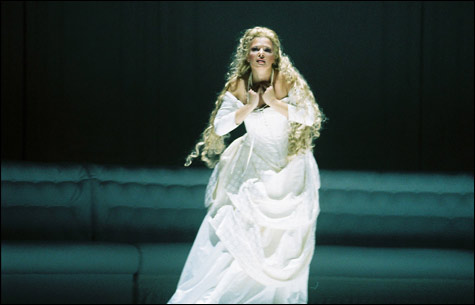
A VIOLETTA TO DIE FOR: Ukrainian soprano Marina Viskvorkina lit up Teatro Lirico d’Europa’s La traviata. |
The Elliott Carter Centennial
Elliott Carter's 100th birthday was celebrated all over the world, but Boston didn't take a back seat. When had a major artist been around long enough to enjoy a centennial while still working at the top of his form? Carter has talked about how hard he used to work, but now composing comes much easier — he just writes what he likes and hurries on to the next piece. At Tanglewood this summer, the entire Festival of Contemporary Music was devoted to him: nearly 50 pieces including two world premieres. Oliver Knussen, with illuminating lucidity, led Carter's vast Symphonia (part of the Boston Symphony Orchestra's first all-Carter program), and the Tanglewood Festival student orchestra played two of Carter's most difficult pieces, the 1955 Variations for Orchestra (under Stefan Asbury) and the 1969 Concerto for Orchestra (under Knussen). There were engaging performances of Carter's poetry settings: Elizabeth Bishop, Wallace Stevens (the haunted In the Distances of Sleep, with young Met mezzo Kate Lindsey), John Ashbery (a bravura student performance of the almost impossible Syringa — in both English and Greek; and the delicious new a cappellaMad Regales), and Lucy Shelton in the exquisite Italian cycle (Montale, Ungaretti, Quasimodo) composed for her.
More Carter
At Boston Conservatory, Ursula Oppens played Carter's (almost) complete music for solo piano — including Matribute, the little gem he wrote as a birthday gift for James Levine's 92-year-old mother. John Heiss assembled a New England Conservatory Carter festival that included the world premiere of a dazzling new percussion piece, Tintinnabulation, the Borromeo String Quartet in a spectacular First Quartet, and cellist Lawrence Lesser and pianist Christopher Taylor igniting the landmark Cello Sonata. That coordinated with more Carter at the Longy School, the Gardner Museum, and the BSO, where James Levine led pianist Daniel Barenboim in another world premiere, Interventions, a week before bringing the same program to Carnegie Hall on Carter's actual birthday, December 11.

Other New Music
Gil Rose, director of the Boston Modern Orchestra Project, put together the Ditson Festival of Contemporary Music at the Institute of Contemporary Art. Participants included the Firebird Ensemble, Scott Wheeler's Dinosaur Annex, Stephen Drury's Callithumpian Consort, David Hoose's Collage New Music and Cantata Singers, cellist Matt Haimovitz, George Russell, Rose's own BMOP, and, celebrating its 40th year, Boston's oldest new-music group, Richard Pittman's Boston Musica Viva. (I heard my first live performances of Elliott Carter at a BMV concert back in 1978.) Pieces by Leon Kirchner, Harold Shapero, Augusta Read Thomas, and John Harbison got stellar treatment. Harbison's BSO-commissioned Symphony No. 5, which sets poems about Orpheus by Milosz, Rilke, and Louise Glück (her Eurydice poem was sung eloquently by Kate Lindsey), got even better at Tanglewood.
Operas to Treasure
Topping the list, James Levine leading Berlioz's two-part Trojan War epic, Les Troyens, with an impressive international cast. I heard the one performance at which both parts were done the same day and was flattened. The touring Teatro Lirico d'Europa brought a satisfying La traviata, with glamorous Ukrainian soprano Marina Viskvorkina as Verdi's tubercular courtesan. Guerilla Opera offered the economical yet hair-raising premiere of Andy Vores's setting of Sartre's three-person horror comedy, No Exit. The opera that made the most news was the John Adams/Peter Sellars Doctor Atomic, which had its Met debut without Sellars's original staging. I actually preferred it at the Fenway Theatre, where big-screen close-ups of the maneuverings for the first atomic test made everything easier to follow than the Met's cluttered blocking. But in all versions, the arresting first half collapses into a second act of long-winded, sentimental PC.
Mark Morris, musician
The Celebrity Series of Boston imported Mark Morris's revival of his Dido and Aeneas, Henry Purcell's great 17th-century opera, which tells in a quarter of the time the same story Berlioz dramatized. At the 1989 Boston premiere, the late Craig Smith conducted the Emmanuel Music chorus and orchestra and the late Lorraine Hunt Lieberson sang Dido. This year the superb Emmanuel musicians were back, and Morris himself conducted. Morris is the most musical of contemporary choreographers, and his sparkling conducting reinforced that opinion.
More Kurt Weill
The Cantata Singers' year-long tribute to Kurt Weill continued with such ambitious and delightful events as Lynn Torgove's wittily semi-staged Weill Cabaret. Music director David Hoose paired Weill with Brahms's Ein deutsches Requiem and Charles Fussell's soaring High Bridge. And Richard Conrad's the Bostonians gave a Weill-on-Broadway concert that featured marvelous Delores Ziegler as psychologically challenged Liza Elliott in scintillating excerpts from Lady in the Dark, the role in which she blew me away in Conrad's complete 2000 revival.
Keyboard magic
I heard three memorable recitals by Russell Sherman, Boston's presiding piano guru: Bach (with an emotionally colored Sarabande in the third English Suite), Liszt's Transcendental Études (a musical rather than simply a technical feat), and Schumann (a wide-ranging, improvisational Arabesque, a subtly mercurial Kreisleriana, and a large-scaled C-major Fantasie). Daniel Barenboim and James Levine played Schubert's exquisite F-minor Fantasy. And the Celebrity Series brought back Slovenian pianist Dubravka Tomsic in incandescent Chopin, Scarlatti, and Beethoven.